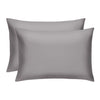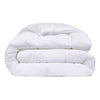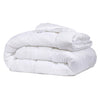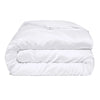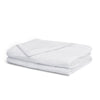The Daily Miracle
Why Do I Get So Hot When I Sleep? 5 Reasons and What To Do About It
Published
June 15, 2022
Author
Nicholas Crusie

There’s almost nothing that can ruin your morning like waking up to find that you’ve basically sweated through your pajamas into your new mattress. Except for maybe waking up in the middle of the night feeling like you’re on fire — the patented, one-leg-out-of-the-comforter move is only so effective.
It can be hard to get restful sleep when you feel like you’re constantly running too hot. So let’s break down some common reasons you might be overheating while you sleep. More importantly, let’s talk about the best way to address these problems and keep you cool.
1. Your Environment Is Too Hot
This one is the most obvious — but if the room you sleep in is too warm, it can interrupt your sleep. Humidity can also have an effect, as higher humidity can magnify heat by preventing your sweat from evaporating. If you live somewhere with hot, sticky summers and you find yourself tossing and turning come July, the weather might be the culprit.
Research has found that heat exposure can keep you awake and prevent you from getting that all-important rapid eye movement (REM sleep). Your bedroom temperature could be what’s keeping you from waking up feeling ready for the day.
What To Do About It
Your sleep environment has a huge impact on the quality of your sleep, particularly for hot sleepers. If changing your room temperature isn’t as simple as pressing buttons on a thermostat, there are still a few ways to promote better sleep.
Fans are an easy option to help increase the airflow around your bed. If you sleep on the top floor of your house, moving to the lowest possible room can also be beneficial because heat rises — so the lower you get, the more refreshed you’ll be. Even just opening a window can increase ventilation and lead to helpful temperature drops.
2. Your Bedding and Sleepwear Aren’t Breathing
We get it — you picked your bedding to match your room decor, and you chose your sleepwear because it looked cute. These items can majorly affect your skin temperature throughout the night.
If you’re sleeping on thick, synthetic sheets under a huge, non-breathable comforter, your body heat will end up trapped, leading to discomfort, excessive sweating, and lower sleep quality. Your pajamas can also disrupt your body temperature. Pajamas that are too tight or made out of a fabric that traps heat may raise your core body temperature while you sleep.
What To Do About It
Change it up! When it comes to sleepwear, not all fabrics are created equal. For instance, studies have shown that wool pajamas improve sleep at lower temperatures (around 63 degrees Fahrenheit). On the other hand, the same research says that cotton pajamas help you sleep better at higher temperatures (around 72 degrees Fahrenheit). Choosing breathable materials for your sleepwear may help you sleep cooler.
When it comes to bedding, the same logic applies. Satin pillowcases may be trendy, but they’re not nearly as breathable as our Extra Luxe Pillow Cases, which are designed to be naturally thermoregulating.
If body temperature fluctuations have you throwing off your duvet and pulling it back up again ten times a night, our Miracle Comforter is all fluff but no sweat. It can help promote temperature regulation throughout the night without forcing you to decrease the cozy factor.
3. Your Bedtime Routine Needs Some Work
Your evening routine matters!
Exercising before bed can help you sleep — but if you exercise too vigorously within an hour of your bedtime, it can increase your body temperature and make it harder to fall asleep. Similarly, caffeine is great in the morning, but drinking it too late in the day can impact your sleep and your core temperature.
Essentially, any activity or substance that increases your heart rate can lead to a higher sleeping temperature.
What To Do About It
Make sure you’ve finished strenuous or stressful activities more than an hour before you get into bed. If you prefer to exercise in the evening, choose something less full-on, like yoga, to help your body wind down rather than amping it up again if night sweats are a problem.
4. You’re Sharing Your Bed
While sleeping with a partner or pet can do wonders for your mental health and potentially for a feeling of bonding in either relationship, not getting enough sleep can hurt both of these.
Even if you aren’t a hot sleeper, when you add the body heat of another person or animal, you can end up increasing your sleeping temperature and be left feeling hot and uncomfortable. This totally defeats the purpose of having a cuddle partner in the first place.
What To Do About It
If separate beds aren’t an option for whatever reason, the best thing you can do is make sure you offset the additional heat in other ways, like with a new and improved Bedding Collection.
Our Extra Luxe Miracle Sheet Set is your best choice in bedding that has everything you need and nothing you don’t. It’s luxuriously soft and odor-resistant. Those two factors are key when you sleep in a crowded bed but want to stay as chilled as a cucumber.
5. Your Medications or Hormone Levels
Certain medications can lead to an increase in body temperature; it’s not that unusual! Anything from antidepressants to diabetes medication to common antibiotics can affect your body’s thermoregulation.
Hormonal changes can also lead to night sweats and discomfort due to temperature. These changes can be the result of conditions like PMS, pregnancy, or medical conditions like hyperthyroidism. Different life stages like perimenopause and menopause are associated with hot flashes, flushing, and night (or day) sweats.
What To Do About It
If it’s about your health, your first course of action should always be to speak with your doctor. They’ll be able to best advise you as to whether it’s worth adjusting any medication you’re on to try to relieve any side effects.
If you are concerned you might have a hormonal imbalance that causes night sweats, that’s a concern best addressed with your doctor as soon as possible.
The Coolest Solution
As we get into the summer months, warmer temperatures can make it difficult to get a good night’s sleep. In fact, studies show that higher temperatures are the most detrimental to your sleep quality. If you find you find yourself feeling less well-rested as the temperatures tick upward, you’re not alone.
This problem can be especially bad if you feel like you “sleep hot” in general. While there may not be much you can do about the weather or certain physical limitations, you can take all sorts of steps to ensure you’re drifting off to dreamland in a clean, cool, yet still cozy environment.
Sources:


